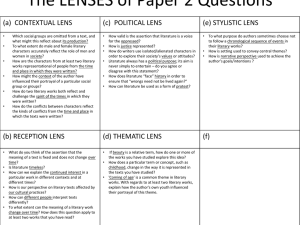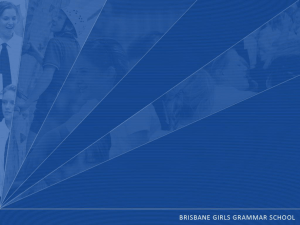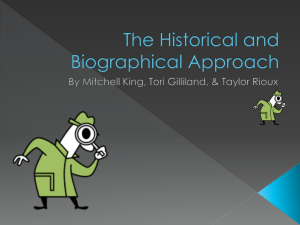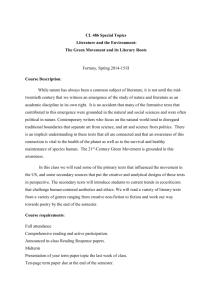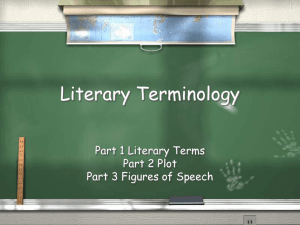MA in English: SDCC - University of Sussex
advertisement
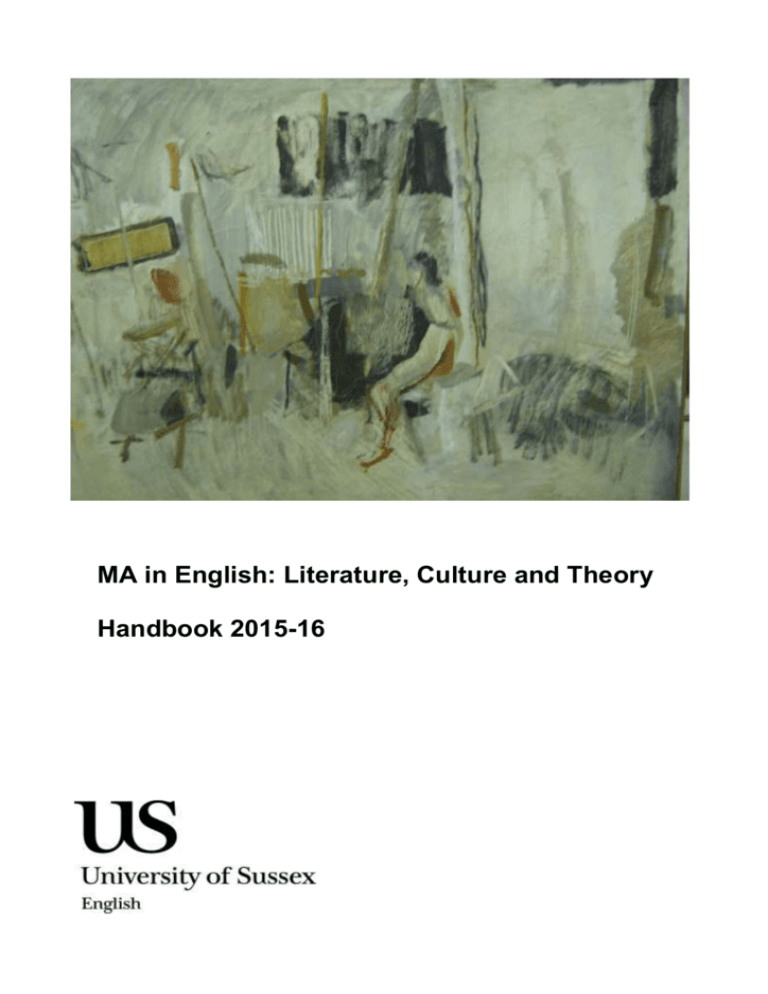
MA in English: Literature, Culture and Theory Handbook 2015-16 Cover Image: Artist’s Studio. Canvas and Paper (unknown) This handbook refers to the MA course in English: Literature, Culture and Theory offered by the School of English at the University of Sussex. The convenor of this course is Dr Michael Jonik. 2 1. Introduction The MA in English: Literature, Culture and Theory at Sussex reflects the diverse and wideranging research and teaching interests of the School of English. The MA’s design allows you either to focus your study on a specific period or concept of literature, or to engage broadly with writing and cultural and theoretical ideas across a wide historic range. You can combine specialist study in literature written before 1900, contemporary theoretical inquiry, and interdisciplinary investigations into literature and visual culture or literature and history according to your particular interests. The core module engages with current theory and methods that underpin research in literature and help equip you for further study and research inside and outside the academy. Options within the course allow you to forge a path in the field that follows your interests. The MA is run from within the School of English. 2. Course structure and specifications For full-time students the course comprises four 12-week modules, two in the Autumn and two in the Spring, followed by the preparation and writing of a dissertation under supervision during the Summer Term and vacation. Modules are normally taught by a two-hour weekly seminar. Each module attracts 30 credits and the Dissertation 60 credits: the total number of credits constituting the course is thus 180. The Core module is assessed by a bibliography, a presentation and a 2000-word critical review. Each of the Options is examined by a 5,000-word term paper, to be submitted before the beginning of the term following that in which the module is taught. The dissertation is up to 15,000 words, submitted at the start of September. Details on how to prepare, present and submit term papers and dissertations are given in the Examination and Assessment handbook. For part-time students, the same requirements are spread over two years, with one module taken in each of the successive Autumn and Spring terms and the preparation and writing of the dissertation extended over two summer periods. Students on the English: Literature, Culture and Theory course are invited to attend a range of colloquia and other extra-curricular activities. These include the English Graduate Colloquium, events organised by The Centre for Early Modern and Medieval Studies, The Sussex Centre for the Visual, the Centre for Critical and Creative Writing, and the 18th- and 19th-Century Seminar.The course modules for 2015-16 are as follows: Autumn Term You take the core module: Interpretation, Theory and Research Methods in Literary Study AND one of the following options: New Configurations in Critical Theory Literature and Society, 1750-1890 The Renaissance Body Spring Term You take EITHER the following two modules: The History of Domesticity: Literature, Public and Private 1700-180 Image and Text 1780-1880 3 OR: one of the above plus one of the following Marxism and Creative Writing Modernism 1910-1945 Theory in Practice: Theory and Literature Voices in the Archives Versions of Realism The Uncanny Spectacular Imaginings Technologies of Capture Summer Term Dissertation 3. Course learning outcomes A student who has completed the MA in English: Literature, Culture and Theory successfully should be able to: demonstrate specialised knowledge of several important areas of concern in literature and cultural history demonstrate the ability to read texts critically write clear and well-argued essays based on a range of reading evaluate and critique existing theories and criticism in the field explain and demonstrate means of accessing and carrying out research on literary documents carry out a substantial and original piece of research within the field 4. Course modules Autumn Term: Interpretation, Theory and Research Methods in Literary Study [This module is taken by all students] This module provides students beginning the MA English Literature, Culture and Theory with the knowledge and practical experience of research methods needed to undertake research as a literary scholar and enables them to interrogate some of the theoretical and cultural assumptions that underpin research in English both past and present. [See full details of this module at the end of this handbook] You also choose one of the following: New Configurations in Critical Theory This module will be an introduction to a range of contemporary critical approaches that have emerged not only out of the influential work of twentieth-century philosophy, literary theory, or psychoanalysis, but also from a variety of disciplinary quarters. More specifically, our investigations will be focused on the question of ‘life’ as it traverses four interrelated topoi – literature, aesthetics, politics, and science – and comprises a number of pressing theoretical issues. These are: affect, sexuality, desire, biopolitics, the body, precarity, animality, the posthuman, ecology and the earth, materialisms, networks and information, or neoliberalism and debt. 4 Literature and Society, 1750-1890 'Literature & Society, 1750-1890' explores the interplay between the nationwide perspectives of social philosophy and the more individualistic concerns of literary culture in the late eighteenth and nineteenth centuries. It offers students a chance to make broad connections across the period, at the same time as providing them with in-depth knowledge of principal theoreticians of culture in these decades and their major works. Emphasis will be placed on the manner in which literary works can be read in conversation with, and in opposition to, social theory, with each seminar structured around close readings of an example of each style of writing. The Renaissance Body In early modern England the body was a major intellectual preoccupation and a focal metaphor informing and shaping cultural structures and artefacts. This period, too, like the cusp of the twenty-first century, had a very distinctive conception of the person as a construct or artifice, as the product of social intervention and cultural organization. Engaging with interpretative models from the fascinating interdisciplinary field of cultural theory of the body, this course explores the aesthetics of embodiment through a range of literary and visual texts, unravelling the dense significance of the corporeal imagination of the Renaissance. Key themes include: the ideal body; body borders, the supernatural and society; gendered voices, sex and agency; the medical imagination; diabolic inversions (the witch’s body); heroic and monstrous masculinities; transvestitism; mystical monarchy; diseased bodies; revolutionary corporealities; body, soul and mind; consuming bodies and eating communities; the fabricated body; rape and pornography. Spring Term: NB: Modules marked with * are 30-credit, level-6 (3rd year BA) special-subject offerings. Students on this MA are allowed to take up to 30 credits at the undergraduate level, if they so choose. You choose EITHER both the following two modules: The History of Domesticity Ideas of the 'private' and the 'public' are central to the ways we think about literature, culture, sexuality and subjectivity, and they are also terms whose history intersects with the emergence of both modern literary culture and modern subjectivities in fascinating ways. Jurgen Habermas's contention, that the convergence of public and private spheres constituted a foundational moment in the emergence of modernity, has significant implications for the way we think about writing, as public, private, or both. This module offers the chance to trace how developing notions of public/private not only informed the development of the recognisably modern literary culture of this period, but were also problematised and contested by it. The module will focus on three intersecting areas: (1) the writing of sexuality within the private/public space of the novel; (2) the politicisation of privacy and secrecy in the politically fraught period of the 1790s; and (3) the representation of domesticities, including the Gothic castle and the cottage, and their resistance of easy categorisations as public/private spaces. Sources examined will range from fictional and non-fictional texts to visual materials, aesthetic and political writings, and contemporary theory. Image and Text 1780-1880 Concentrating on the intersections between visual and verbal cultures in the eighteenth and nineteenth centuries, this module explores the intricate inter-relationships of visual images and texts (poetry, non-fictional prose, and fiction). Beginning with Edmund Burke's A Philosophical Enquiry into the Origin of our Ideas of the Sublime and the Beautiful (1757) and Immanuel Kant's 'Analytic of the Sublime' from The Critique of Judgement (1790), in relationship to recent 5 theoretical work on the sublime (by Lyotard and Eagleton for example), we consider the aesthetic of the sublime as played out in painting and in art theory. Subsequent topics include: the case of the Elgin Marbles; Ekphrasis; discourses of the grotesque in John Ruskin and William Morris; poetry and scientific discourse; Pre-Raphaelitism; the history and theory of nineteenth century photography; representations of childhood in Lewis Carroll, Christina Rossetti and J.M. Barrie; 'Symbolism' and the 'Supernatural'. OR one of the above plus one of the following modules: Marxism and Creative Writing In the wake of the end of the Cold War and especially since 'September 11', as neoconservatives replaced Marxism with 'terrorism' as their new and irrational enemy, many writers in America and Europe sought with redoubled commitment to revitalise elements of Marxist thinking in their creative practice: to confront the new dominant form of rationality with a creative rationality of the dominated. This module will investigate the history and present significance of that commitment in several ways: through study of the tradition of Marxist thinking about the relation of aesthetics to social and political life; through consideration of mainstream trends in contemporary literature and the economic and political interests they reflect and fortify; and through the evaluation of theoretical claims made by contemporary writers themselves, both in creative writing and in criticism, about their own strategies of opposition and the problem of their potential efficacy. Modernism 1910-1945 This module will explore the achievements and limits of English modernism through a detailed examination of the work of two of its principal writers, T.S. Eliot and Virginia Woolf. Eliot's contributions as a poet, essayist and dramatist were key to the revolution in the theory and practice of modern poetry while Woolf's contributions as a novelist and essayist were key to the revolution and practice of the modern novel. The module will explore the similarities and differences in their treatment of mind and consciousness, their views of and treatment of history, their representation of the city, their attitudes to questions of sexuality and gender, their notions of nation and of national identity, their responses to new mass cultural technologies from the popular press to photography, radio and the cinema, and their responses to the key events of the period in which they lived, including the First and the Second World Wars, the Spanish Civil War and the rise of fascism. The module will be organised chronologically and thematically and will enable students to follow personal as well as intellectual associations between Eliot and Woolf and between Eliot, Woolf and their modernist contemporaries. The module will in particular reflect on the ways in which Woolf responded as a writer to Eliot's work and Eliot as a writer responded to Woolf's work. Theory in Practice: Theory and Literature What is 'theory'? Although it goes in and out of fashion with the speed of rising or plunging hemlines, the use of theory, literary theory, or literary criticism as a way to read literary texts is always useful. And contrary to popular opinion, it's not the application of an arcane or secret language to garner a secret knowledge. Rather, it is a self-conscious and informed method of analysing the presuppositions behind the apparently natural way we read; indeed, sometimes it's a method of reading in itself, derived from a philosophy or theory of language, as is the case with Bataille or Derrida. Theory sounds dull, but really it's a creative practice, as is reading, which Walter Benjamin likened to telepathy. This module seeks, through a number of case studies, to address a number of critical paradigms that have proved significant in the post-war period. In particular, notions of materialism, materiality and historicity will be set in tension with ideas about relativism, deconstruction and 'play' as very different ways of construing some iconic American texts. Alongside the close reading of primary and secondary texts, discussions in class will be directed towards such subjects as: the construction/reflection of subjectivity in language and discourse; the relation of the literary text to sociality; the effects and efficacy of modernist/avant-garde/postmodern literary techniques; and the writing of race, gender and class. 6 Voices in the Archives This module invites you to consider the ways creative writing uses history, from pragmatic research strategies to theoretical implications. We think about how different literary genres engage with the past through form, narrative and literary language, looking at the cultural impact of contemporary historical fiction, and also considering work by poets and film-makers. Authors studied may include Sarah Waters, Ian McEwan, Toni Morrison, Hilary Mantel, David Dabydeen, Mario Petrucci, George Szirtes and Michel Hazanavicius. Creative workshops introduce key research skills, exploring the methodological implications of using physical and virtual archives. Working with historical newspapers, letters, diaries, prints, photographs and other documents, we immerse ourselves in old-fangled vocabularies, and experiment with using language from the past to inflect our contemporary voices. Topics for discussion include the critical and ethical implications of writing about real historical events and characters. We consider how contemporary writing is founded on a long tradition of writing from history – often re-visiting the past with a particular political or creative agenda – from Shakespeare and Dickens onwards. Additionally, we explore how recent historical fiction interacts with other genres, for example in the fantasies of Susanna Clarke and Angela Carter. We consider theoretical work on memory and nostalgia by critics such as Mieke Bal and Svetlana Boym. Versions of Realism In the long, ongoing period of cultural modernity, realism has become the most obdurate, ubiquitous, malleable, and persistent of artistic modes. Variously understood as a period, genre, style, or movement, as both reflection of nature and function of technology, as wildly revolutionary and deeply conservative, realism tends to be everywhere, in part, because we are not sure what it is exactly. This diffuseness around the term's use, however, is belied by the ease with which the term is used to designate works of art. In one of its most famous guises, realism plays the part of the antecedent (Oedipal) other that modernism seeks to destroy, or at least displace. And yet, this understanding of realism (and modernism) fails to register both the survival of realist concerns and textual manoeuvres in modernist texts and the way in which realist forms themselves (if we are even able to pin them down as such) already articulate many or most of modernism's ideological and aesthetic claims. This module will explore theories and histories of realism and will attempt to apprehend realism's elusiveness through a series of rubrics: the type, the document, the literal, totality, reflection, revolution, transparency, impersonality, populism, automatism, contingency, necessity, and nothingness. The Uncanny* The uncanny is difficult to define: it is mysterious, eerie, at once strange and familiar. It offers especially productive possibilities for exploring issues of identity and liminality, boundaries and interdisciplinarity. This module will engage with the uncanny across a wide range of texts and contexts, extending from literature (novels, short stories, drama and poetry) to film. Discussion will focus on a number of linked topics, including repetition, doubles, strange coincidences, animism, live burial, telepathy, death and laughter. The module aims to develop students' engagement with the notion of the uncanny across a broad range of literary and other texts; to develop students' skills of reading and critical analysis, especially insofar as the uncanny by its nature engenders intellectual uncertainty and calls for an unusual critical patience; to enhance students' capacity for critical reflection on their experience of the familiar and the strange, the ordinary and the extra-ordinary. Spectacular Imaginings* Spectacular Imaginings explores English Renaissance drama and its staging between the advent of the commercial theatres in London (circa 1580) and their closure during the early 1640s as a consequence of the English Civil War. This new module has been developed with, and will be cotaught by, scholars and theatre practitioners at London's Globe Theatre. The Globe's programme at both its new indoor Jacobean theatre (the Sam Wannamaker theatre), as well as its main outdoor theatre, will form an important part of this module with students attending performances at both venues. The module will focus on a selection of plays from this period, exploring them in their 7 original social, cultural and aesthetic contexts. It will also reflect upon why plays from this era are so frequently and successfully re-produced for the modern stage and screen. What roles did theatre play in London during the Renaissance and why was England virtually unique in Europe (Spain is the only counterpart) in creating a large-scale commercial theatre that generated a vast corpus of new plays? The module examines many of the most significant themes with which this theatre engages; among them, unruly sexualities (incest, adultery, rape); violence and eloquence; London and city commerce; domestic tragedy; marriage and divorce; the place of the court; the foreign and the exotic; and the supernatural. It considers the roles of genre, acting styles, theatre companies, star actors, boy players, audiences and the varying physical spaces of the theatres in mediating these themes. Students will have access to the unique Globe archives when researching their dissertation projects. Four of the plays will be determined by the Globe's season (including at least one by Shakespeare). The tragedies, comedies, histories and tragi-comedies studied will include works by Marlowe, Webster, Ford, Middleton, Dekker, Beaumont and Fletcher, Cary, Marston and Shakespeare. Technologies of Capture* The photographic image is ubiquitous; its presence has morphed into many twenty-first century cultural manifestations. Most obviously, in digital form, the photograph has become a staple of social networking sites and other visual modes of communication. Yet, at its invention in 1839, the status and future of photography was far from clear-cut. Known as 'the black art from France' owing to its miraculous transcription of the visual world, photography was frequently aligned with magic. Indeed, owing to its causal connection to its referent, a photograph had the status of an imprint as well as an image. People also delighted in seeing themselves the right way round, as it were, as the photograph corrected the lateral inversion of the familiar mirror image. At the other end of the spectrum, however, photography's 'birth' was considered by some enough to bring about the 'death' of painting. In the nineteenth century, the presence of the camera radically affected major social, aesthetic, and philosophical categories. While photographs variously revolutionised representation, their relationship to existing visual and verbal forms was a rich and complex one that raised many questions. What did it mean, for example, to speak about literary 'realism' in the context of Fox-Talbot's new negative/positive process? How did post-mortem photographs affect literary portrayals of death and the spirit world? What was the impact upon Victorian institutions such as the asylum of the new genre of the photographic 'mug-shot'? What form of translation occurred when a two-dimensional photograph recorded the three-dimensional form of sculpture? This module explores the emergence and development of the photographic medium in relationship to a range of literary texts. Beginning with the 'pre-history' of photography as manifest in a range of optical toys, gadgets, and visual spectacles, it traces the emergence of various photographic forms as they intersect with literary ones. Students have the opportunity to engage, in the context of nineteenth century fiction, poetry and non-fictional prose, fascinating material and conceptual changes that occur in the wake of the advent and popularisation of photography. 5. Teaching and learning Depending on where you were an undergraduate, you may find that you have either fewer or more teaching hours as an MA student than you did when you were studying for your BA. Full-time students normally do two modules at any one time: each of these involves a weekly seminar of two hours. In addition to the seminar, a number of three-hour workshops in research methods are attached to the core module. All module tutors have weekly office hours that you are expected to use to ask for more targeted advice or for clarifications about module requirements and structures. You are also strongly encouraged to attend relevant open seminars that are brought to your attention. In addition, you should spend about 30 hours a week in individual study. English at Sussex promotes our research activities principally through our accredited Research Centres and our seminar series. MA students participate in Centre events as part of a vibrant critical and creative environment around literature and language from the Middle Ages to the 8 Contemporary. The Centres are: Creative and Critical Thought; Early Modern and Medieval Studies; Modernist Studies; The Study of Sexual Dissidence; Sussex Centre for the Visual. The seminar series are: American Studies, 18th- and 19th-Century Studies, and Research on Language and Linguistics (ROLLS). We also run a weekly research colloquium during term-time, designed to stimulate interdisciplinary and broad conceptual thinking and to engage with future research directions. The University and the School of English provide certain facilities and resources – most notably, a library, the use of computers, and a space where learning is constantly pursued. Your tutors will direct your study with reading lists and all kinds of informal advice. Your ideas and conclusions will be put to the test in seminars, where you will be expected to have reached some views of your own and to be able to argue for them. Your written work will be formally assessed to determine your degree result, and you will receive feedback on your term papers as you go along. We will help you as much as we can, but what you get out of your study will depend on how much you put into it: your mastery of the subject is primarily something for you to achieve. Though we have put structures to assist you in this endeavour, they cannot do the work for you. Individual study The largest, and in many ways the most important, part of your working time will be spent on your own, or discussing ideas, theoretical models, and conceptual issues with your fellow students. It is important to organise your time effectively, and to plan your use of the library, especially if you have to do paid work as well as your academic work. A word of advice: always set yourself specific and realistic targets when you work, and take regular breaks. Set yourself to read a particular article or chapter of a book, or to work for a pre-determined length of time (say one and a half hours) and then pause when you have completed this task. A few periods of intense concentration, separated by short breaks, will serve you far better than any amount of time spent sitting at a desk but not really concentrating. Module seminars The focus of your work for each module will be a weekly seminar. You should be in command of the reading set, and be prepared to try out your own ideas and to defend them in discussion. Module seminars are compulsory. In many seminars, some form of presentation will also be required: your tutor will give you guidance on the form which presentations are expected to take and how to prepare them. Essays We require that your essays be professionally presented: typed or word-processed, with full scholarly references and a bibliography. Pay particular attention to matters of spelling, style and punctuation. Poor punctuation is one of the commonest failings in student essays, even at postgraduate level. If you are unsure about correct punctuation, get hold of a guide: there are several inexpensive and readable guides on the market. As a general guideline, a well-presented professional essay is the result of (at least) three drafts. A first exploratory one in which you set down your ideas and support them with relevant evidence; a second one which goes over the first draft and reorganises paragraphs, expands sentences where needed, or cuts out repetitive chunks; and a third one, which should really be only a proofreading draft, to clear out spelling and/or punctuation mistakes, spot the repetition of the sentence you cut and pasted too many times, or insert the verb/article/preposition you accidentally removed when cutting and pasting. 9 Module evaluation Student evaluation forms are issued at the end of each module and are scrutinised by the tutors associated with the module before it is taught again. These forms are anonymous, and are an opportunity for you to tell us what you felt about all aspects of the module, including the material covered, teaching methods, and the adequacy of library and web resources. We take your comments and suggestions for improvement very seriously. We do not, of course, guarantee to be able to meet all student requests, first because we have to operate within tight financial constraints, and second because we have to exercise our own academic judgement about the desirability of any change. In addition, some key areas – notably the library facilities – are beyond the immediate control of the School of English. But we do guarantee to give active consideration to all serious suggestions for change and improvement. Student support Information about student support is available from the Student Life Centre on 01273 876767, email studentlifecentre@sussex.ac.uk. 10 6. Assessment Criteria Band Percentage Variation Qualities Distinction 70-100% 80-100% Truly exceptional work that could be published with little or no further development or alteration on the strength of its original contribution to the field, its flawless or compelling prose, its uncommon brilliance in argument and its demonstration of considerable knowledge of the topics and authors treated on the module. 70-80% Outstanding work that might be fit for publication or for development into a publishable article. Work that is exceptional for its originality of conception and argument, its conduct of analysis and description, its use of research and its demonstration of knowledge of the field and of the core materials studied on the module. Merit 60-69% Good or very good work that is thoughtfully structured or designed, persuasively written and argued, based on convincing use of research and fairly original in at least some of its conclusions. Pass 50-59% Satisfactory work that meets the requirements of the module and sets out a plausible argument based on some reading and research but that may also include errors, poor writing, or some unargued and improbable judgements. Fail 0-49% 35-49% Work that is inadequate with respect to its Unsatisfactory argument, its use and presentation of research and its demonstration of knowledge of the topics and authors treated on the module, or that is poorly written and difficult to follow or understand. 15-34% Very unsatisfactory Work that plainly does not meet the requirements of the course and that fails to make any persuasive use of research or to conduct any argument with clarity or purpose. 0-15% Unacceptable or not submitted. 11 7. Teaching faculty and associates The following brief profiles show you the nature of the teaching and research interests of those associated with the MA in English: Literature, Culture and Theory, though not all will be teaching on the course in the current year. You can find fuller details of tutors’ interests and publications at their individual staff profiles on the Sussex website: use the staff search at http://www.sussex.ac.uk/people. Although not all of these tutors are offering a module in the current academic year, most of them will be available for MA dissertation supervision in the Summer Term. Richard Adelman works on Romantic and Victorian literature and cultural politics. He is the author of Idleness, Contemplation and the Aesthetic, 1750–1830 (Cambridge University Press, 2011), which charts the development of a British idealism in the last decades of the eighteenth century. Matthew Dimmock specialises in Early Modern English Literature and History, including notions of 'otherness' which concern cultural, racial and religious difference – particularly in reference to Islam. Andrew Hadfield works on Literature and Politics in the English Renaissance, especially: Republicanism; Spenser and sixteenth-century poetry; Shakespeare; Early Modern Ireland; Travel Writing; National Identity; Colonialism; Britain and Britishness; life writing. Margaret Healy’s primary area of research is early modern texts and culture and she is particularly interested in the intertexture of literary, medical and scientific, political and religious writings in this period and the way that metaphors of the body mediate debates which intersect these categories. Her research thus engages with cultural theory of the body as expounded by anthropology, sociology, literary theory, history and cognitive philosophy. She has worked extensively on representations of the body with particular emphasis on the writings of Shakespeare, Montaigne, Milton, Dekker, Spenser and Defoe. Tom Healy works on the cultural imagination of the sixteenth and seventeenth-century in England. He has written extensively on English literature of the Civil War period, including Crashaw, Milton and Marvell, and on Elizabethan and Jacobean theatre, especially Marlowe and Shakespeare. Michael Jonik specialises in nineteenth-century American and transatlantic literary and intellectual history; science and the mind; Continental philosophy and contemporary critical theory; psychoanalysis; Deleuze and Foucault; 'life' and biopolitics; ecology; risk; Marxism, anarchism and radical politics. Rachel O’Connell started teaching at Sussex in January 2012. She studied for her PhD in the Department of English Literature at New York University, where she also taught literature and writing; she also has an MSc in Gender Studies from London School of Economics. She specialises in Victorian literature, especially the fin de siecle, and also in queer, gender, and disability studies. She teaches primarily critical theory and LBGT/queer studies. Catherine Packham works on eighteenth century literature, and particularly the interface of literature, science and political theory. Chloe Porter’s current research explores meeting points between literary and visual cultures, with a particular emphasis on visual experience in works by playwrights including Shakespeare, Jonson, Chapman, Greene and Lyly. Nicholas Royle researches modern literature and literary theory, especially deconstruction and psychoanalysis; the uncanny; creative writing. 12 Lindsay Smith works on Victorian literature (especially poetry and non-fictional prose), painting, photography, and visual perception in the nineteenth century. Sam Solomon’s teaching and research are broadly in twentieth century and contemporary literature (poetry and cross-genre writing especially) as they relate to radical social movements; he has written on the connections of gay and women's liberation to political economy, particularly in the context of Marxist-feminist praxis. Research and teaching interests include: creative writing, feminism, Marxism, contemporary poetics, cross-genre and documentary writing, queer theory, critical university studies, Yiddish literature and culture, literary translation, aesthetics and politics. Bethan Stevens has research interests which involve people and groups whose work crosses over between the visual and the literary, such as William Blake; the Flaxmans (an eighteenthcentury family including an RA sculptor, book-illustrator and amateur writer); eighteenth- and nineteenth-century producers of chapbooks and illustrated novels; the Pre-Raphaelites; Virginia Woolf and Vanessa Bell. Katie Walter’s research to date has focused on notions of the body forged in the intersections of medical, religious and literary traditions in late medieval England. Other particular research interests include: the idea of the vernacular; medieval literary theory; reading and book cultures; pedagogy and epistemology; the body; the senses; William Langland's Piers Plowman; the works of Reginald Pecock. Marcus Wood works on satire, the representation of slavery in the eighteenth and nineteenth centuries; colonial and post-colonial literature and theory. Tom Wright works on American and English writing, principally of the 19th century. He is particularly interesting in the idea of public speech, book culture and Anglo-American Writing. He has recently published The Cosmopolitan Lyceum: Lecture Culture and The Globe in NineteenthCentury America and has completed the manuscript of a new book, Lecturing the Atlantic: Antebellum speech and an Anglo-American Commons. 13




